新概念英语第三册部分课堂笔记
- 格式:doc
- 大小:264.50 KB
- 文档页数:79
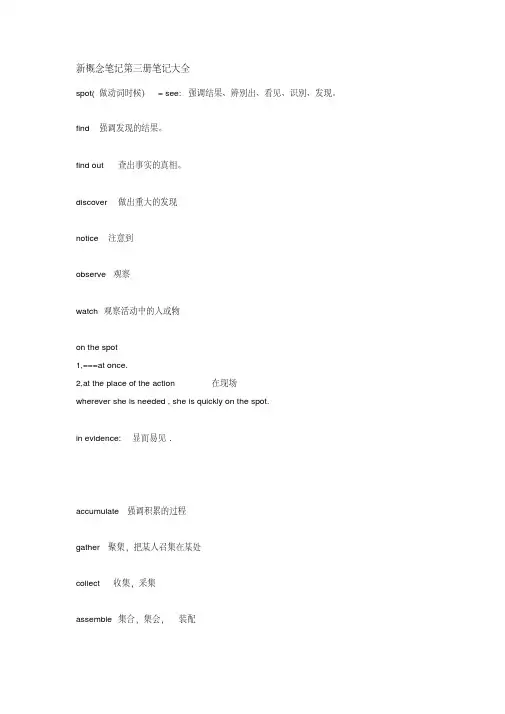
新概念笔记第三册笔记大全spot(做动词时候) = see:强调结果、辨别出、看见、识别、发现。
find 强调发现的结果。
find out 查出事实的真相。
discover 做出重大的发现notice 注意到observe 观察watch 观察活动中的人或物on the spot1,===at once.2,at the place of the action 在现场wherever she is needed , she is quickly on the spot.in evidence:显而易见.accumulate 强调积累的过程gather 聚集,把某人召集在某处collect 收集,采集assemble 集合,集会,装配hoard 大量地贮存The squirrel hoards up nuts for the cold winter. amass 积聚(主要用于诗歌和文学作品)feel obliged to do sth.感觉有必要做某事be obliged to do sth 被迫做某事run after 强调追赶、追求.seek 追寻(梦想,理想)===pursue chase 追赶.be cornered ,,,被逼得走投无路常用于被动语态:The thief was cornered at lastThe problem cornered metrail==follow 跟踪convinced sb. of sth 使sb相信sthsb be convicned sb相信somewhat ==a littleat large1:逃遁的,没有被控制的。
2,详细的(in detail)3,总体来讲(as a whole)(An idea),come to sb.某人突然想到了,,take sth. seriously==deal with sth. seriously 严肃对待某事take sth. lightly: 草率对待某事声称曾经作过某事: claim to have done sthin the possession of sb==in sb's possession 归某人所有in possession of sth. 拥有某物take possession of 拥有It is disturbing to think that 一想到,,,就心里不安in a trap 落入陷阱中no more than ====== onlyequal:A equal B:None of us can equal her, either in beauty or as a dancer.be equal to + n: 有能力做某事 to- 介词recognized sb as 认出某人是whatever: ever 用来坚强语气get used to , be used to doget前调渐进的过程,be强调习惯了的状态In1,表达惊奇,恐惧,失望或生气等感情色彩的名词搭配连用in surprise; in astonishment;in alarm; in embarrassment; in amazement; in despair; in dismay; in anger; indisappointment2,表达以、用;用于语言,书写材料,色彩或声音等方面in English; in pencil; in ink ; in a few words; in such a high voice;in oil; in red; in code3,用于状态、情况或处境in trouble; in difficulty; in bed; in a hurry; in debt; in love with sb;in tears; in good order; in good repair; in good health;in por health. in the bad mood; in the good mood; in haste;in a favor of excitement; in poverty; in luxuryrun a shop 经营商店joined at the hip 表示交情极厚的Eg: There two are joined at the hipshoot from the hip 信口开河Eg: Sorry,i said that i shouldn't have shot from the hip,,date from ,,(风俗,习惯)从,,开始happen to do 强调事情的偶然发生Eg: I happen to have dirven that kind of carIt happens that,,Eg: It happnes that i met her on my way to workhappen on 巧遇,偶然发现Eg: I happend on this old picture in the back of the drawer. Guess, who i happend on while i was in london last month?turn out 表明结果turn out ( to be) + n/adj.Eg: Our part turned out (to be) a successthe concert turned out to be failure.It turned out that,,,,原来是(表示结果)Eg: It turned out that the diamond had been in the bank all the time.as it turns out 人们后来发现Eg: As it turns out, there was not need to worry.As it turns out, the report was mistaken.so far,up to now 都是现在完成时的标志beforhand:(a.) 事先== in advance.at this distance of/in time : 时隔已久Eg: I can hardly remember him at the distance of timefar more moneyfar--副词,用来强调语气==muchin the case of: 至于,就,,而言Eg: Stealing is no shame in the case of him.in case of: 万一,以防Eg: You should ensure your house in case of firein a simple way: 简单的,简朴的Eg: She was always dressed in a simple way.go to extreme (to do)走极端Eg: He went to extreme to say that the play was the best one.journalist (杂志) 新闻记者reproter (电视台) 记者correspondent (电台)记者,通讯员sack(俚语) 解雇,辞退Eg: If you do it wrong again you will be sacked.instruct sb. to do sth ==tell sb. formally to do sth. 正式告诉某人做某事refuse: 拒绝(态度严厉)decline: 婉言谢绝repudiate: 断然拒绝set out to do sth.==decide and try to do 决定,打算,着手做=set about doing Ega: He set out to make his first 1,000,000 in 5 years倒装简述:not only 位于句首,必须采用倒装形式否定副词位于句首,要倒装。
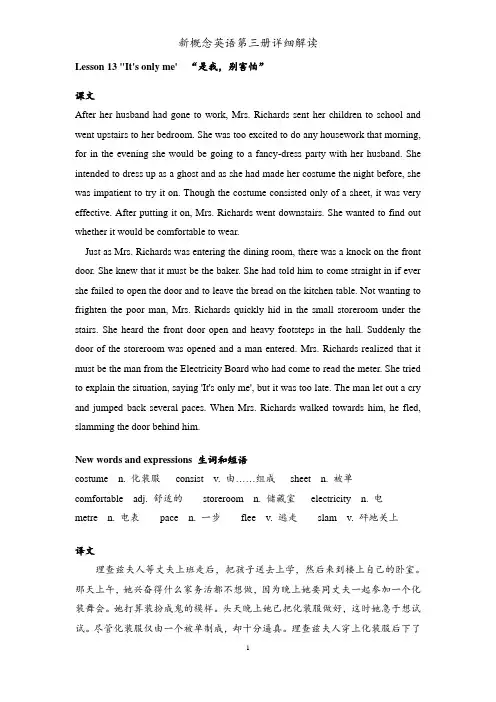
Lesson 13 "It's only me' “是我,别害怕”课文After her husband had gone to work, Mrs. Richards sent her children to school and went upstairs to her bedroom. She was too excited to do any housework that morning, for in the evening she would be going to a fancy-dress party with her husband. She intended to dress up as a ghost and as she had made her costume the night before, she was impatient to try it on. Though the costume consisted only of a sheet, it was very effective. After putting it on, Mrs. Richards went downstairs. She wanted to find out whether it would be comfortable to wear.Just as Mrs. Richards was entering the dining room, there was a knock on the front door. She knew that it must be the baker. She had told him to come straight in if ever she failed to open the door and to leave the bread on the kitchen table. Not wanting to frighten the poor man, Mrs. Richards quickly hid in the small storeroom under the stairs. She heard the front door open and heavy footsteps in the hall. Suddenly the door of the storeroom was opened and a man entered. Mrs. Richards realized that it must be the man from the Electricity Board who had come to read the meter. She tried to explain the situation, saying 'It's only me', but it was too late. The man let out a cry and jumped back several paces. When Mrs. Richards walked towards him, he fled, slamming the door behind him.New words and expressions 生词和短语costume n. 化装服consist v. 由……组成sheet n. 被单comfortable adj. 舒适的storeroom n. 储藏室electricity n. 电metre n. 电表pace n. 一步flee v. 逃走slam v. 砰地关上译文理查兹夫人等丈夫上班走后,把孩子送去上学,然后来到楼上自己的卧室。
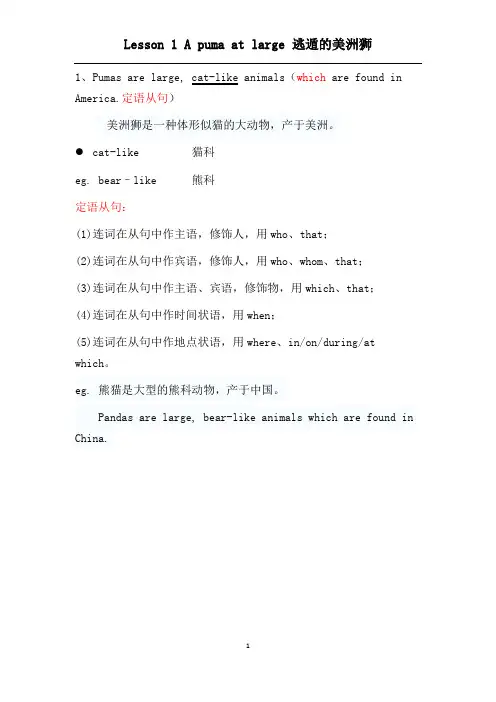
1、Pumas are large, cat-like animals(which are found in America.定语从句)美洲狮是一种体形似猫的大动物,产于美洲。
cat-like 猫科eg. bear–like 熊科定语从句:(1)连词在从句中作主语,修饰人,用who、that;(2)连词在从句中作宾语,修饰人,用who、whom、that;(3)连词在从句中作主语、宾语,修饰物,用which、that;(4)连词在从句中作时间状语,用when;(5)连词在从句中作地点状语,用where、in/on/during/at which。
eg. 熊猫是大型的熊科动物,产于中国。
Pandas are large, bear-like animals which are found in China.2、(When reports came into London Zoo时间定状语从句)(that a wild puma had been spotted forty-five miles south of London同位语从句:解释说明report的内容), they were not taken seriously.当伦敦动物园接到报告说,在伦敦以南45英里处发现一只美洲狮时,这些报告并没有受到重视。
●spot (n.) 斑点,地点(v.) 看见 = see/notice (spotted spotted)●sb. spot/see/notice sth. 某人看见某物(主动语态)= sth. be spotted/seen/noticed by sb. (被动语态)= sth. catch one’s eyes= sth. come into one’s view●they指代reports●take sth. seriously 重视某事反:take sth. lightly 对某事草率3、However,(as the evidence began to accumulate,时间状语从句) experts from the Zoo felt obliged to investigate主句, (for the descriptions given by people [who claimed to have seen the puma were extraordinarily similar.原因状语从句)定语从句]可是,随着证据越来越多,动物园的专家们感到有必要进行一番调查,因为凡是声称见到过美洲狮的人们所描述的情况竟是出奇地相似。
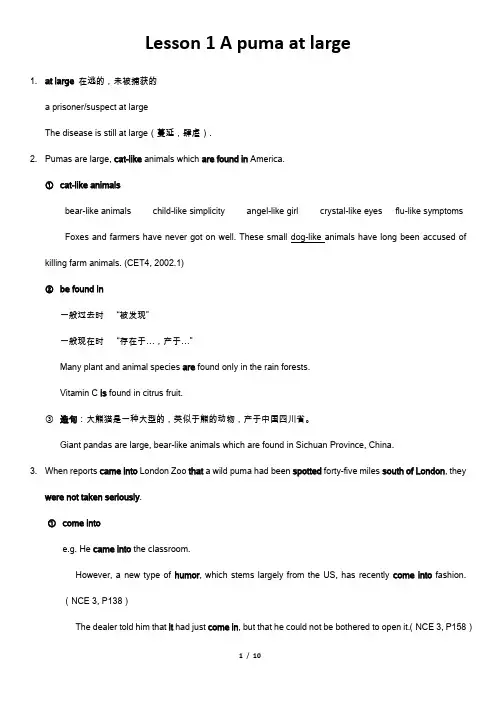
Lesson 1 A puma at large1.at large在逃的,未被捕获的a prisoner/suspect at largeThe disease is still at large(蔓延,肆虐).2.Pumas are large, cat-like animals which are found in America.①cat-like animalsbear-like animalschild-like simplicityangel-like girlcrystal-like eyesflu-like symptomsFoxes and farmers have never got on well. These small dog-like animals have long been accused of killing farm animals. (CET4, 2002.1)②be found in一般过去时“被发现”一般现在时“存在于…,产于…”Many plant and animal species are found only in the rain forests.Vitamin C is found in citrus fruit.③造句:大熊猫是一种大型的,类似于熊的动物,产于中国四川省。
Giant pandas are large, bear-like animals which are found in Sichuan Province, China.3.When reports came into London Zoo that a wild puma had been spotted forty-five miles south of London, theywere not takenseriously.①come intoe.g. He came into the classroom.However, a new type of humor, which stems largely from the US, has recently come into fashion.(NCE 3, P138)The dealer told him that it had just come in, but that he could not be bothered to open it.(NCE 3, P158)无灵主语/物称主语(inanimate subject)e.g. The sea bed was scoured with powerful nets and there was tremendous excitement on board when a chest was raised from the bottom.(NCE 3, P150)满堂花醉三千客,一剑光寒十四洲。
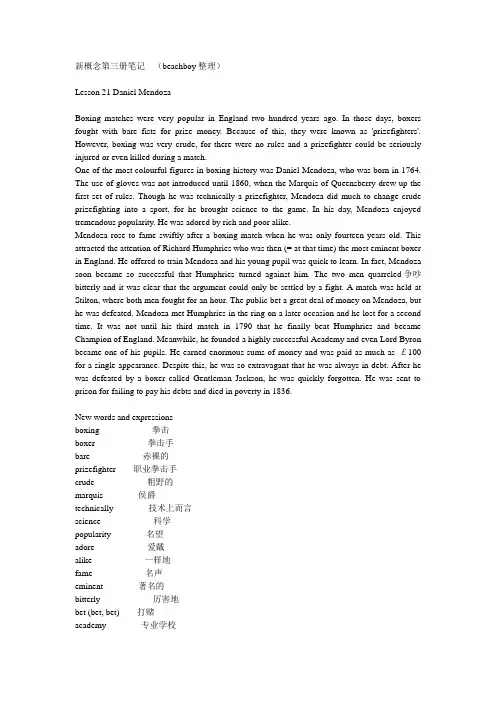
新概念第三册笔记(beachboy整理)Lesson 21 Daniel MendozaBoxing matches were very popular in England two hundred years ago. In those days, boxers fought with bare fists for prize money. Because of this, they were known as 'prizefighters'. However, boxing was very crude, for there were no rules and a prizefighter could be seriously injured or even killed during a match.One of the most colourful figures in boxing history was Daniel Mendoza, who was born in 1764. The use of gloves was not introduced until 1860, when the Marquis of Queensberry drew up the first set of rules. Though he was technically a prizefighter, Mendoza did much to change crude prizefighting into a sport, for he brought science to the game. In his day, Mendoza enjoyed tremendous popularity. He was adored by rich and poor alike.Mendoza rose to fame swiftly after a boxing match when he was only fourteen years old. This attracted the attention of Richard Humphries who was then (= at that time) the most eminent boxer in England. He offered to train Mendoza and his young pupil was quick to learn. In fact, Mendoza soon became so successful that Humphries turned against him. The two men quarreled争吵bitterly and it was clear that the argument could only be settled by a fight. A match was held at Stilton, where both men fought for an hour. The public bet a great deal of money on Mendoza, but he was defeated. Mendoza met Humphries in the ring on a later occasion and he lost for a second time. It was not until his third match in 1790 that he finally beat Humphries and became Champion of England. Meanwhile, he founded a highly successful Academy and even Lord Byron became one of his pupils. He earned enormous sums of money and was paid as much as £100 for a single appearance. Despite this, he was so extravagant that he was always in debt. After he was defeated by a boxer called Gentleman Jackson, he was quickly forgotten. He was sent to prison for failing to pay his debts and died in poverty in 1836.New words and expressionsboxing 拳击boxer 拳击手bare 赤裸的prizefighter 职业拳击手crude 粗野的marquis 侯爵technically 技术上而言science 科学popularity 名望adore 爱戴alike 一样地fame 名声eminent 著名的bitterly 厉害地bet (bet, bet) 打赌academy 专业学校extravagant 浪费的(贬义)poverty 贫困Notes on the textl race(速度)比赛├contest(能力)赛└match比赛speech contest演讲赛┌have nothing on没穿衣├naked (忌)├nude 裸体的├undressed没穿衣└bare赤裸的(可某一部分)The girl stood in the rain bare headed.头上没带帽with bare fists赤手空拳bare footed光脚The wall is bare of any kind of ornaments.无任何装饰物l rude无理→crude粗野的├vicious歹毒的├evil邪恶的└brufal残暴的The singer enjoys tremendous popularity.l these days最近└In those days当时For this reason代替Because of thisl 补充习语1. Don't bother. 不麻烦你了2. Oval office政府,政治中心=White House3. do all the talking我来交涉4. He lost heart. 失去信心5. Just as I thought.正如我所料6. high roller挥金如土的人(卷袖高的人)7. hot air吹牛,屁话8. Be my guest随便点,补Help yourself的不足9. cold fish冷淡的人10. small talk聊天chat太随意了l rash鲁莽的└merciless无情的love ┐respect ┴=adore爱戴He was adored by rich and poor alike.adoring look爱戴的目光┌popularity名望,受欢迎├fame名、fortune利├renown v.n.闻名的└reputation名声good reputationbad reputationThis actress enjoys enormous popularity.l I bet it snows tomorrow.├You bet = You're right.└make a bet on sth.打赌┌That's right. /Okay我赞成,同意├That's it.├That's for sure.├I'm for you.├I'm with you.├You said it.你说到了(表同意)└You can say that again.你说的对,你说的在理l academic学术的└academy专业学校┌wasteful浪费的├excessive过分的├unduly adv.过分地└extreme极端的l in prosperity在富贵中├in poverty贫困中├in health└in sicknessdraw up起*do much to做了很多工作change A into BHe does much to change English learning into the enjoyment of language, for he brought art to the class.rise to fame名声鹊起be quick to learn学的很快l turn down拒绝refuse├turn up出现├turn again反目成仇└turn to求助于┌beat sb. ┐├defeat sb. ┼打败├win over sb. ┘└convince sb.说服l in the case of在…情况下├under various circumstance├in the situation└on another occasion在另一场合on the outskirt在郊区It was not until his graduation in 1980 that he realized that he hadn't mastered English.掌握Exercise*so long no see好久不见*for one so young = for one who is so young1. In those days, they called boxers 'prizefighters' because they fought with bare fists for prize money.2. A prizefighter could suffer a serious injury or even be killed during a…3. Mendoza did a great deal to change boxing into a sport.4. He was so extravagant that he always owed people money.5. One of the most vivid personalities in boxing history was…*personality体育运动员6. - after a boxing match at the exceptionally young age of fourteen.*marvelously精彩的*singly简单的*exceptionally特别的*unequally不平等的7. Mendoza's rise to fame was noted by Richard Humphries.8. Humphries soon became jealous of Mendoza's success.*jealous of嫉妒9. Mendoza finally beat Humphries and became Champion of England.Lesson 22 By heartSome plays are so successful that they run for years on end. In many ways, this is unfortunate for the poor actors who are required to go on repeating the same lines night after night. One would expect them to know their parts by heart and never have cause to falter. Yet this is not always the case并不总是这样.A famous actor in a highly successful play was once cast in the role of an aristocrat who had been imprisoned in the Bastille for twenty years. In the last act, a gaoler would always come on to the stage with a letter which he would hand to the prisoner. Even though the noble was expected to read the letter at在活动中each performance, he always insisted that it should be written out in full.One night, the gaoler decided to play a joke on his colleague to find out if, after so many performances, he had managed to learn the contents of the letter by heart. The curtain went up onthe final act of the play and revealed the aristecrat sitting alone behind bars in his dark cell. Just then, the gaoler appeared with the precious letter in his hands. He entered the cell and presented the letter to the aristocrat. But the copy he gave him had not been written out in full as usual. It was simply a blank sheet of paper. The gaoler looked on eagerly, anxious to see if his fellow actor had at last learnt his lines. The noble stared at盯the blank sheet of paper for a few seconds. Then, squinting转his eyes, he said: 'The light is dim. Read the letter to me.' And he promptly handed the sheet of paper to the gaoler. Finding that he could not remember a word of the letter either也, the gaoler replied: 'The light is indeed实在是dim, sire. I must get my glasses.' With this说着, he hurried off the stage. Much to the aristocrat's amusement, the gaoler returned a few moments later with a pair of glasses and the usual copy of the letter which he proceeded to read to the prisoner.New words and expressionsrun (run, run) 连映lines 台词part 剧中的角色falter 结巴说cast(cast, cast) 选派…扮演角色role 角色aristocrat 贵族imprison 关押gaoler 监狱长colleague 同事curtain 幕布reveal 使显露cell 单人监房blank 空白的squint 眯(眼)看dim 昏暗sire 陛下(古用法)proceed 继续进行Notes on the textl run out(short) of用光了├running nose流鼻涕├running water自来水├run for竞选│run away with私奔└=elopeThe play has run for years.┌on the line在接电话├drop me a line来封信└line up排列play a ___ ┬part in…谁在…起└role着作用┌a great├a important重要的├a tremendous了不起的└a peculiar奇特的cast┬铸造bronze├抛弃cast a fly钓鱼└被扮演角色He was cast in the role of a ghost.l have a heart…发发善心吧├take sth. to heart认真对待├lose one's heart to sb./sth.倾心└by heart背下,记住┌on and off时断时续地└on end连续不断地go on doing持续做某事never have cause to do…没有理由做…,绝不能…This is not the case at all. 情况根本不是这样l imprison关押├empower赋于力量└enlighten启发┌workmate工友├co-worker工友├colleague同事└fellow worker搭档┌peer眯着眼看├peep窥视└squint眯眼(动作)┌dim figure模糊的身影├gloomy阴沉的(天气)├dusky昏暗的└darkyproceed = continue= begin to dojump┬on to…方向└onto…动作(短)l come on1快点;2挑衅→过来;3不满(下降)生气;4加油;5撒娇;l I insist you (should) leave now.I suggest the letter be written now.虚拟语气:下列动词后的"宾语从句"中需要用虚拟形式,即should+动词原形,should在美国英语中要省略(TOEFL语法考点)。
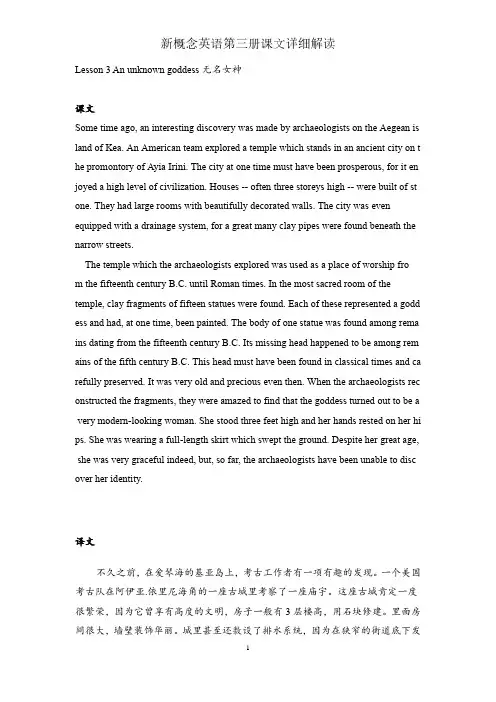
Lesson3 An unknown goddess无名女神课文Some time ago,an interesting discovery was made by archaeologists on the Aegean is land of Kea.An American team explored a temple which stands in an ancient city on t he promontory of Ayia Irini.The city at one time must have been prosperous,for it en joyed a high level of civilization.Houses -- often three storeys high -- were built of st one.They had large rooms with beautifully decorated walls.The city was even equipped with a drainage system,for a great many clay pipes were found beneath the narrow streets.The temple which the archaeologists explored was used as a place of worship from the fifteenth century B.C.until Roman times.In the most sacred room of the temple,clay fragments of fifteen statues were found.Each of these represented a godd ess and had,at one time,been painted.The body of one statue was found among rema ins dating from the fifteenth century B.C.Its missing head happened to be among rem ains of the fifth century B.C.This head must have been found in classical times and ca refully preserved.It was very old and precious even then.When the archaeologists rec onstructed the fragments,they were amazed to find that the goddess turned out to be a very modern-looking woman.She stood three feet high and her hands rested on her hi ps.She was wearing a full-length skirt which swept the ground.Despite her great age, she was very graceful indeed,but,so far,the archaeologists have been unable to disc over her identity.译文不久之前,在爱琴海的基亚岛上,考古工作者有一项有趣的发现。
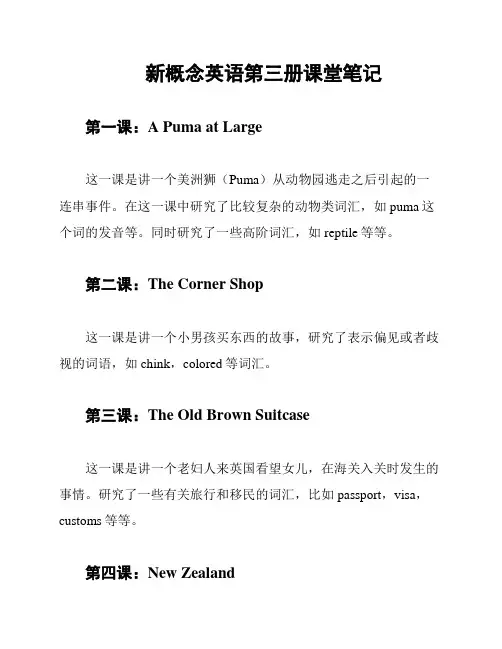
新概念英语第三册课堂笔记
第一课:A Puma at Large
这一课是讲一个美洲狮(Puma)从动物园逃走之后引起的一连串事件。
在这一课中研究了比较复杂的动物类词汇,如puma这个词的发音等。
同时研究了一些高阶词汇,如reptile等等。
第二课:The Corner Shop
这一课是讲一个小男孩买东西的故事,研究了表示偏见或者歧视的词语,如chink,colored等词汇。
第三课:The Old Brown Suitcase
这一课是讲一个老妇人来英国看望女儿,在海关入关时发生的事情。
研究了一些有关旅行和移民的词汇,比如passport,visa,customs等等。
第四课:New Zealand
这一课是介绍新西兰的一些景点、风俗和文化,研究了一些与旅游相关的词汇,比如tour,arrangement等等。
第五课:Dead Men’s Path
这一课是讲非洲的一所学校校长试图改善学校环境和质量的故事,以及他和当地居民之间的冲突。
研究了一些值得思考的词汇,比如superstition等等。
总结
新概念英语第三册是一本适合中高级英语学习者使用的教材,在词汇量和语法难度上都有了一定的提高。
通过学习这本教材,可以不仅仅提高自己的阅读和听力能力,还能更好地了解西方文化和习惯。

新概念英语第三册课堂笔记及答案Last revision date: 13 December 2020.Lesson 12Life on a desert island【New words and expressions】生词和短语★desert island荒岛desert: 沙漠背弃,遗弃dessert: 甜点★unrealisticadj. 不真实★paradisen. 天堂,乐士A lot of people imagine the USA as their paradise. heaven: 天堂,天国,也指死亡★wretchedadj. 可怜的,艰苦的miserablelead a wretched/miserable/terrible life★starvev. 挨饿starve to death★elementn. 成分★opportunityn. 机会golden opportunityOpportunity knocks only once.chance: 表机会时可以与opportunity互换,表可能性时则不可There is a chance that I will see himThe chances are that he will be elected the president. of,to★coraln. 珊瑚★Virgin Islands维尔京群岛★Miamin. 迈阿密(美国最南的城市)★dinghyn. 救生筏,小船★Caribbeann. 加勒比海★spear gun捕鱼枪★lobstern. 龙虾★tankern. 油轮★genuinelyadv. 由衷地He is genuinely thankful to megenuine(adj.)(n.)genuineness★Robinson Crusoe鲁滨孙.克鲁索(小说《鲁滨孙漂流记》主人公)荒岛生活【课文讲解】form an unrealistic picture of sth.: 对……抱有不切实际的幻想A large number of people have formed an unrealistic picture of the job.imagine sth.to be./imagine sth.asquite the opposite: 恰恰相反Either you or I am going to the party.谓语动词和最接近的主语保持一致an element of truth: a bit of truthoptimistic: 乐观的pessimistic: 消极的,悲观的wish在谓语动词,其后的宾语从句中要使用虚拟语气虚拟语气的结构形式取决于所表达的实际情况如果表达对现在的遗憾或现在相反的情况,that从句中的动词要采用过去时,be 动词要用were如果表达对过去的遗憾或过去相反的情况,that从句中的动词要采用过去完成时I wish I hadn't spent so much money.I wish that you had written to him如果表达与将来事实相反的情况或将来不可能实现的心愿,that从句中要使用would ,could 等情态动词的过去时I wish that I could go abroad tomorrow.I wish that you could come here tomorrowif only要比wish更富有戏剧性和感情色彩If only the weather would change.I wish the weather would change.We wish that we knew where to look for him.If only we knew where to look for him.If only we could have gone to the party.If only you hadn't said that.If only you would come here tommorrow.have sth.repairedload with: 把……装载到……上The workers are loading the truck with goods.unload: 卸hardly any: very little/fewHardly anybody likes him because he is so rude.You hardly eat anything,what's wrong?prove to be=turn out to beput: expressIf only we could have stayed on the desert island a little bit longer. 【Special difficulties】wish,if only;(1) ...had bought it...显然说明的是过去的情况"was"(2) ...couldn't/wouldn't make such noise...(3) ...were here...强调“他在这儿,该有多好”运用be动词,说明现在情况相反的概念无论什么人称,be动词应该使用were(4) ...could play the piano as well...(5) ...had studied hard then..."studied" ---过去式(6) ...hadn't mentioned it to him..."mentioned" -- 过去式【Multiple choice questions】(1) ...C...要么是过度乐观,要么是过度的悲观(2) ...d...essential = very necessary 绝对必要的,必不可缺的(3) ...a...fend for oneself: 独立的照料某人虚拟语气(4) ...b...think of sb./sth.as: 把某人、某事看作为...(5) ...d..."few of us": 我们当中,没有几个人(6) ...c...after介词,其后要和名词、动名词搭配and前后连接的并列成分,时态是应该相呼应的。
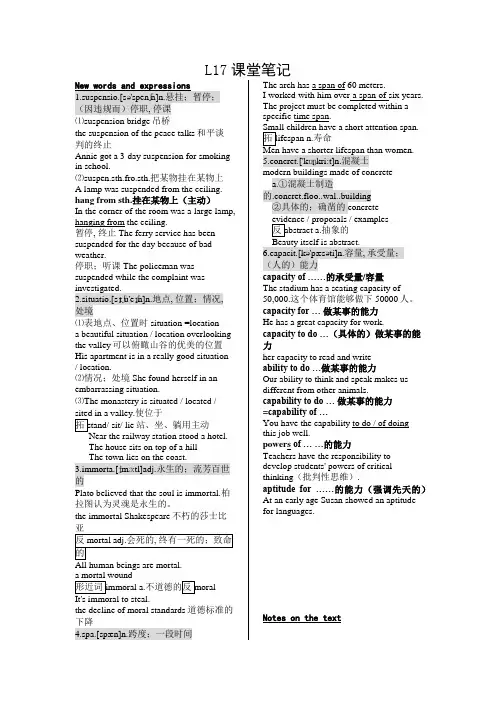
L17课堂笔记New words and expressions1.suspensio.[sə'spenʃn]n.悬挂;暂停;(因违规而)停职, 停课⑴suspension bridge吊桥the suspension of the peace talks和平谈判的终止Annie got a 3-day suspension for smokingin school.⑵suspen.sth.fro.sth.把某物挂在某物上A lamp was suspended from the ceiling.hang from sth.挂在某物上(主动)In the corner of the room was a large lamp,hanging from the ceiling.暂停, 终止The ferry service has beensuspended for the day because of badweather.停职;听课The policeman wassuspended while the complaint wasinvestigated.2.situatio.[sɪtʃu'eɪʃn]n.地点, 位置;情况,处境⑴表地点、位置时situation =locationa beautiful situation / location overlookingthe valley可以俯瞰山谷的优美的位置His apartment is in a really good situation/ location.⑵情况;处境She found herself in anembarrassing situation.⑶The monastery is situated / located /使位于站、坐、躺用主动The house sits on top of a hillThe town lies on the coast.3.immorta.[ɪ'mɔ:tl]adj.永生的;流芳百世的Plato believed that the soul is immortal.柏拉图认为灵魂是永生的。
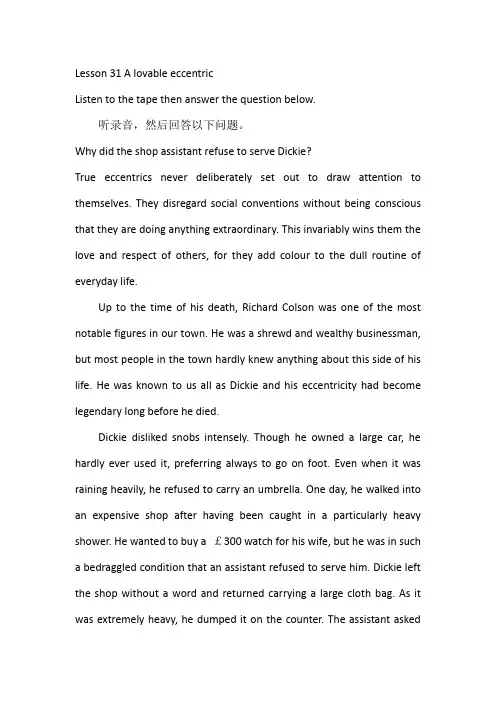
Lesson 31 A lovable eccentricListen to the tape then answer the question below.听录音,然后回答以下问题。
Why did the shop assistant refuse to serve Dickie?True eccentrics never deliberately set out to draw attention to themselves. They disregard social conventions without being conscious that they are doing anything extraordinary. This invariably wins them the love and respect of others, for they add colour to the dull routine of everyday life.Up to the time of his death, Richard Colson was one of the most notable figures in our town. He was a shrewd and wealthy businessman, but most people in the town hardly knew anything about this side of his life. He was known to us all as Dickie and his eccentricity had become legendary long before he died.Dickie disliked snobs intensely. Though he owned a large car, he hardly ever used it, preferring always to go on foot. Even when it was raining heavily, he refused to carry an umbrella. One day, he walked into an expensive shop after having been caught in a particularly heavy shower. He wanted to buy a £300 watch for his wife, but he was in such a bedraggled condition that an assistant refused to serve him. Dickie left the shop without a word and returned carrying a large cloth bag. As it was extremely heavy, he dumped it on the counter. The assistant askedhim to leave, but Dickie paid no attention to him and requested to see the manager. Recognizing who the customer was, the manager was most apologetic and 'reprimanded the assistant severely. When Dickie was given the watch, he presented the assistant with the cloth bag. It contained £300 in pennies. He insisted on the assistant's counting the money before he left---- 30,000 pennies in all! On another occasion, he invited a number of important critics to see his private collection of modern paintings. This exhibition received a great deal of attention in the press, for though the pictures were supposed to be the work of famous artists, they had in fact been painted by Dickie. It took him four years to stage this elaborate joke simply to prove that critics do not always know what they are talking about.New words and expressions 生词和短语lovable adj. 可爱的eccentric n. (行为)古怪人disregard v. 不顾,漠视convention n. 习俗,风俗conscious adj. 感觉到的,意识到的invariably adv. 总是,经常地routine n. 常规;惯例shrewd adj. 精明的eccentricity n. 怪僻legendary adj. 传奇般的snob n. 势利小人,谄上欺下的人intensely adv. 强烈地bedraggled adj. 拖泥带水的dump v. 把……砰的一声抛下apologetic adj. 道歉的reprimand v. 训斥stage v. 暗中策划elaborate adj. 精心构思的【参考译文】真正古怪的人从不有意引人注意。
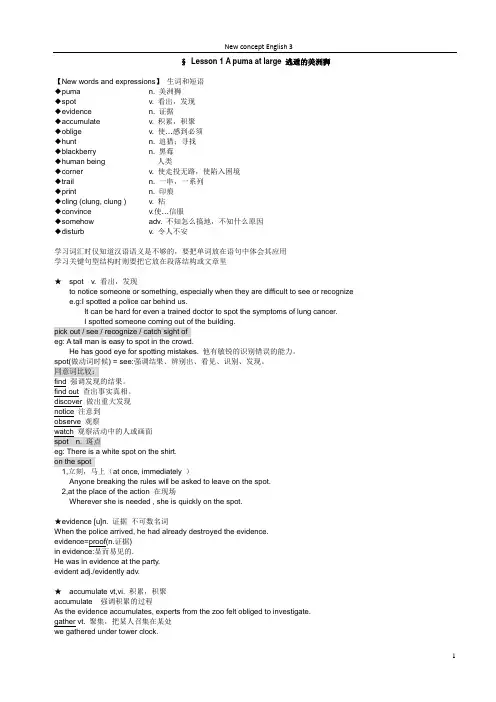
新概念三第39课课堂笔记《新概念三第39课课堂笔记》新概念英语第三册第39课,那可是有不少有趣又有用的知识点呢。
先来说说课文里的单词部分。
有好多单词就像一个个小宝藏,等着咱们去挖掘。
比如说“rough”这个单词,它可不仅仅是表面粗糙的意思哦。
在课文里如果形容大海“rough”,那就是说大海波涛汹涌呢。
这就好比一个人脾气很“rough”,那就是很暴躁的感觉。
咱们学单词可不能只记一个意思,就像认识一个朋友,不能只知道他一方面的性格一样。
再看看课文中的语法点。
这里面的时态运用就很值得研究。
有些句子用了过去进行时,这种时态就像是在给我们讲述过去某个特定时刻正在发生的事情。
就好像你回忆小时候,你正坐在院子里玩耍的时候,妈妈在厨房做饭,这就是过去进行时的一种体现。
它让整个故事变得更生动,好像把当时的场景给我们重新展现了一遍。
还有课文中的句子结构。
有些句子很长,就像一条长长的锁链,一环扣一环。
但是每一个环节都是必不可少的。
比如说那些带有从句的句子,从句就像是锁链上的小分支,它们各自承担着不同的功能。
主句子就像树干,从句就像树枝,共同组成了一棵大树。
这棵大树就是一个完整的句子,给我们传达着丰富的信息。
从课文的内容来看,它讲述的故事也很有深意。
可能是关于一个人的经历,或者是一种社会现象。
这就好比我们看一部电影,电影里的情节反映了很多现实生活中的东西。
通过对课文内容的学习,我们能够了解到不同的文化、不同的价值观。
再讲讲里面的一些短语搭配。
这些短语搭配就像做菜时的调料一样,缺了它们,句子就会变得平淡无味。
像“be in for”这个短语,如果不知道它的意思,在理解句子的时候就会一头雾水。
可当你知道它是“肯定会经历,注定要遭受”的意思时,整个句子就变得清晰明了了。
在课堂笔记里,可能还会有老师对一些难点的解释。
这些难点就像一道道关卡,我们要跟着老师的思路去突破它们。
有时候一个难点就像一个迷宫,我们自己走可能会迷路,但是有了老师的指引,就像手里有了地图,能够顺利地走出来。
新概念英语三笔记(新东方版)新概念三第一课一. snob appeal 对于那种攀比的人群所构成吸引的消费二. dragon (贬义词)母夜叉亚洲四小龙:Four tigers三. find 丢了又找到了discover 原来存在,但不知道,后来发现(药品都是discover出来的,翻译时用研制)spot =>pick out;recognize 是在很多相同或相近的人或事物中单独拿出、识辨出来1.a spot of 一点例:Recent I have had a spot of trouble.最近我有点麻烦。
2.a beauty spot :指人,美人痣;指物,风景名胜3.put sb. On the spot 让某人难堪(点儿背)=>embarrass sb. 让某人尴尬例:The case of taxation evasion has put the famous actress on the spot.这起偷税漏税事件使这位女演员十分难堪。
4.in the spotlight 某人特别引人注目(爱出风头)例:Don‘t you think that the actress Zhang Zi Yi is becoming more and m ore in the spotlight?你不觉得章子怡越来越引人注目了吗?5.on the spot =>at once\right away\immediately 马上例:I‘m coming on the spot.我马上到。
on the spot 在现场例:The killer was caught red-handed(adv.) on the spot.杀人犯在现场被抓个人赃俱获。
6.sb. have a soft spot for sth. 某人喜欢某人\某物(对……心动\心软)例:I always have a soft spot for cat.我特别喜欢猫。
新概念英语第3册笔记Lo15篇第一篇:新概念英语第3册笔记 Lo1单词1.puma美洲狮at large逍遥自在,行动自由escape逃跑(从危险中成功逃脱)2.spotn.点,斑点be in the spotlight万众瞩目v.发现observe 观察,观测discoverrecognizedetect探测explore发现3.evidencen.证据= proofin evidence显而易见的4.accumulate v.积累,积聚(强调积累的过程)gather vt.聚集,把某人召集在某处collect 收集,采集assemble 集合,集会; vt.装配hoard vt.大量的贮存hoard up = store upamass 积聚= come together(主要用于诗歌和文学作品中)6.human being(s)人类(区别于神和动物)5.oblige v.使...感到必须feel obliged to do sth.感觉有必要做某事be obliged to do sth.被迫做某事oblige sb.to do sth.要求某人做某事6.huntv.打猎,狩猎hunt for/go hunting for搜寻,寻找7.blackberry黑莓n.8.human being人类(区别于神和动物)for the time being眼下,目前come to being 形成,成立9.cornern.at/on the corner 在角落里(如介词用in表示在空间的内部)around the corner即将到来,即将发生v.被逼到墙角里,使走投无路10.trailn.一串,一系列a trail of一连串11.print n.印痕,痕迹12.cling v.粘cling to sth.粘在某物上13.convince v.使…信服14.somehow ad.不知怎么搞的,不知什么原因15.dieturb v.令人不安课文1.be found 产于2.south of在南边3.take sth.seriously认真对待take sth.slightly不把...放在心上4.for引导原因状语从句时不能置于句首as 不强调原因的重要性since 既然,弱因果关系because 强的直接的原因5.claimed to have done动词不定式的完成式:体现它所表示的动作发生在谓语动作之前。
1、Has it ever happened to you?这种事情在你身上出现过吗?(疑问句句式:写作技巧)●mutilate (v.) 毁坏,使…残缺不全(标题处用了“借代”的修辞手法)2、Have you ever put your trousers in the washing machine andthen remembered there was a large bank note in your back pocket?你有没有把裤子塞洗衣机,然后又想起裤子的后兜有一张大面值的纸币?●money [u] :bank note 纸币[c]coin 硬币cash 现金credit card 信用卡eg. 一张10英镑纸币a ten-pound bank note(作定语)The bank note is ten pounds.(作表语)two ten-pound bank notes 二张10英镑纸币3、(When you rescued your trousers时间状语从句), did you find the note was whiter than white?当你把裤子抢救出来时,你有没有发现那张纸币已经变得比白纸还白?●rescue (v.) 营救(save sb. from the dangerous place)save (v.) 挽救(通用)4、People (who live in Britain定语从句) needn't despair (when they made mistakes like this (and a lot of people do)!时间状语从句)当英国人犯这种错误时,他们不必感到绝望(而许多国家的人都有这种绝望的感觉)。
●despair (v./n.) 绝望反:hope 希望●despair of sb./sth./doing sth.= lose hope of / give up hope of对…不抱希望/绝望eg. 她开始对被救绝望了。
新概念英语第三册课堂笔记Lesson 1A Puma at large逃遁的美洲狮【New words and expressions】生词和短语学习词汇时仅知道汉语语义是不够的,要把单词放在语句中体会其应用学习关键句结构是则要把它放在段落结构或文章里★puman. 美洲狮★spotv. 看出,发现pick out,see,recognise,catch,sight ofspot=see : 强调结果、辨别出、看见、识别、发现find : 强调发现的结果find out:查出事实真相discover:做出重大发现notice:注意到observe:观察watch:观察活动中的人或画面A tall man is easy jto spot in the crowd.He has good eye for spotting mistakes.n. 斑点There is a white spot on the shirt.on the spot1.立刻,马上(at once ,immediately)Anyone breaking the rules will be asked to leave on the spot.2.at the place of the action 在现场Wherever she is needed,she is quickly on the spot.★evidencen. 证据不可数名词When the police arrived,he had already destroied the evidence.evidence=proofin evidence: 显而易见的He was in evidence at the party.evidently ,evidently★accumulatev. 积累,积聚强调积累的过程As the evidence accumulates,experts from the zoo felt obliged to investigate. gather vt. 聚集,把某人召集在某处collect 搜集,采集assemble 集合,集会,vt.装配hoard vt. 大量的储存hoard up=store upamass 积聚(主要用于诗歌和文学作品)The squirrel hoards up nuts for the cold winter★obligev. 使……感到必须feel obliged to do sth 感觉有必要做某事be obliged to do sth. 被迫做某事★huntn. 追猎;寻找run after 强调追赶、追求seek/pursue 追寻chase 追赶hunt forsearch 搜寻某处为了寻找到某人或某物★blackberryn. 黑莓★human being人类★cornerv. 使走投无路,使陷入困境n.角落at the corner of the streetin the corner of the roomon the corner of the desk经常使用被动语态The thief was cornered at lastThe problem cornered me.★trailn. 一串,一系列(vt.)trail:followThe police trailed the criminal to the place where he was hiding★printn. 印痕★clingv. 粘clungShe is always clinging to her mother.He clung to the hope that he would succeed.stick 粘住; stick to 坚持; sticky 粘的★convincev. 使……信服convince sb.of sth.和宾语从句that搭配使用没有宾语的情况下要采用主系表结构:be convinced★somehowadv. 不知怎么搞地,不知什么原因by some means,in some way ,for some reason unknownsomewhat : a little★disturbv. 令人不安disturbing: 令人不安的disturbed: 感到不安的exciting:令人激动的excited:感到激动的Listen to the tape then answer the question below.听录音,然后回答以下问题。
Where must the puma have come from?Pumas are large, cat-like animals which are found in America. When reports came into London Zoo that a wild puma had been spotted forty-five miles south of London, they were not taken seriously. However, as the evidence began to accumulate, experts from the Zoo felt obliged to investigate, for the de<I>script</I>ions given by people who claimed to have seen the puma were extraordinarily similar.The hunt for the puma began in a small village where a woman picking blackberries saw 'a large cat' only five yards away from her. It immediately ran away when she saw it, and experts confirmed that a puma will not attack a human being unless it is cornered. The search proved difficult, for the puma was often observed at one place in the morning and at another place twenty miles away in the evening. Wherever it went, it left behind it a trail of dead deer and small animals like rabbits. Paw prints were seen in a number of places and puma fur was found clinging to bushes. Several people complained of "cat-like noises' at night and a businessman on a fishing trip saw the puma up a tree. The experts were now fully convinced that the animal was a puma, but where had it come from? As no pumas had been reported missing from any zoo in the country, this one must have been in the possession of a private collector and somehow managed to escape. The hunt went on for several weeks, but the puma was not caught. It is disturbing to think that a dangerous wild animal is still at large in the quiet countryside.参考译文美洲狮是一种体形似猫的大动物,产于美洲。
当伦敦动物园接到报告说,在伦敦以南45英里处发现一只美洲狮时,这些报告并没有受到重视。
可是,随着证据越来越多,动物园的专家们感到有必要进行一番调查,因为凡是声称见到过美洲狮的人们所描述的情况竟是出奇地相似。
搜寻美洲狮的工作是从一座小村庄开始的。
那里的一位妇女在采摘黑莓时的看见“一只大猫”,离她仅5码远,她刚看见它,它就立刻逃走了。
专家证实,美洲狮非被逼得走投无路,是决不会伤人的。
事实上搜寻工作很困难,因为常常是早晨在甲地发现那只美洲狮,晚上却在20英里外的乙地发现它的踪迹。
无论它走哪儿,一路上总会留下一串死鹿及死兔子之类的小动物,在许多地方看见爪印,灌木丛中发现了粘在上面的美洲狮毛。
有人抱怨说夜里听见“像猫一样的叫声”;一位商人去钓鱼,看见那只美洲狮在树上。
专家们如今已经完全肯定那只动物就是美洲狮,但它是从哪儿来的呢?由于全国动物园没有一家报告丢了美洲狮,因此那只美洲狮一定是某位私人收藏豢养的,不知怎么设法逃出来了。
搜寻工作进行了好几个星期,但始终未能逮住那只美洲狮。
想到在宁静的乡村里有一头危险的野兽继续逍遥流窜,真令人担心。
【课文讲解】at large:逃遁的,没有被控制的详细地(in detail)总体来讲(as a whole)在英文的表达方式中,首先呈现给读者的是结果写议论文的时候要注意把握观点Pandas are large cat-like animals which are found in Asia.life-like: 栩栩如生的一般来讲定语从句和同位语从句紧随在被修缮名词后面,但为了保持句子平衡,也可以把谓语动词放到从句之前定语从句只是对于被修缮词的补充说明、修缮;同位语从句则是讲述被修饰名词的内容定语从句的引导词:指人:主语who; 宾语who/whom; 定语 whose表达事物:that(也可以指人)/which时间状语:when; 地点状语:where; 原因状语:why同位语从句:名词做主语、宾语等,关系词用that而不是which时间-when;地点-whereAn idea came to her that she might do the experiment in another way.I have no idea what has happened to him。